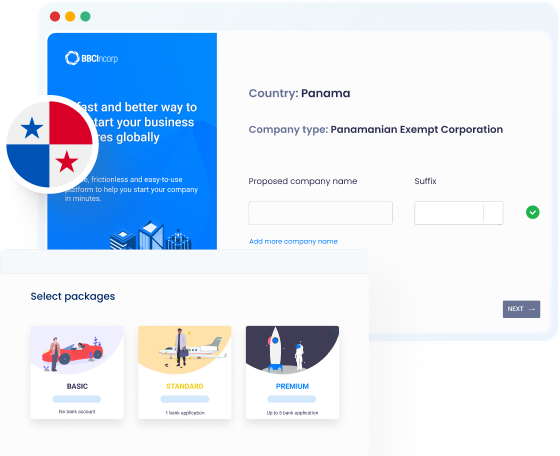Offshore Company Formation Plans with Comprehensive Legal Support
Offshore Company Formation Plans with Comprehensive Legal Support
Blog Article
Browsing the World of International Company: Insights on Offshore Company Formation
Offshore Company Formation offers a calculated opportunity for global business procedures. It provides significant benefits, such as tax obligation optimization and enhanced personal privacy. The process is not without its difficulties. Understanding the intricacies of numerous territories and regulative needs is necessary. As businesses think about these choices, the steps involved can greatly impact their lasting success. What are the crucial elements that can bring about efficient offshore administration?
Understanding Offshore Business: Definition and Purpose
Offshore firms have actually come to be a prime focus in international business discussions as a result of their special legal and monetary structures. These entities are developed in jurisdictions beyond the owner's nation of house, often with desirable regulative environments. Generally, overseas companies offer different objectives, such as possession security, tax obligation optimization, and improved personal privacy. They can run in multiple markets including profession, innovation, and finance, giving versatility for global operations.The specifying attribute of an offshore Company is its ability to carry out organization worldwide while taking advantage of lowered tax obligation responsibilities and governing concerns. This structure interest investors and entrepreneurs seeking to diversify their profiles and handle threats successfully. Additionally, many offshore territories use rewards to attract international financial investment, causing a rise in the Formation of these firms. Understanding the definition and purpose of overseas firms is vital for maneuvering via the intricacies of international commerce and capital flow.
Secret Advantages of Offshore Company Formation
The Formation of an overseas Company provides numerous compelling benefits that bring in entrepreneurs and financiers alike. One of the key advantages is tax obligation optimization; several jurisdictions offer desirable tax rates or exceptions, enabling organizations to make the most of revenues. In addition, overseas companies typically enjoy better confidentiality, as many jurisdictions have strict privacy regulations protecting the identities of Company proprietors and shareholders.Another considerable benefit is possession security. Offshore entities can safeguard possessions from political instability and economic recessions in the owner's home nation. In addition, these companies can promote international trade, giving very easy access to international markets and simplifying cross-border transactions.The adaptability in company framework additionally interest local business owner, as overseas companies can be customized to meet specific operational needs. On the whole, the tactical Formation of an offshore Company can result in improved monetary safety and security, functional performance, and a durable global existence.

Typical Obstacles in Developing Offshore Entities
Establishing offshore entities presents several challenges that services must navigate. Key concerns consist of regulatory compliance, which can vary considerably throughout jurisdictions, and the effect of cultural distinctions on operations. In addition, companies must consider the threats and prices associated with preserving an offshore presence, which can impact overall viability.
Regulatory Conformity Issues
When they seek to establish offshore entities, navigating regulative compliance issues poses substantial obstacles for organizations. Each territory has its own collection of laws and regulations, which can differ extensively and may be difficult to navigate. Companies often face difficulties pertaining to tax conformity, anti-money laundering policies, and coverage demands. Additionally, changes in worldwide tax obligation legislations can produce uncertainty, making it important for businesses to stay updated on conformity commitments. Failing to stick to these regulations can cause severe charges, including penalties and reputational damage. Engaging and understanding the legal structure with neighborhood professionals is necessary for effective offshore procedures, guaranteeing that companies can operate within the boundaries of the legislation while enhancing their international method.
Social Differences Effect

Expense Considerations and Risks
Steering via the monetary landscape of overseas entity Formation offers various price considerations and inherent threats. Initial setup expenses often include legal fees, enrollment expenses, and compliance costs, which can collect considerably. Additionally, continuous maintenance expenses such as yearly costs and accounting services should be factored in. Moreover, rising and fall governing settings in different jurisdictions present dangers, possibly leading to legal issues or unanticipated expenses. Companies might additionally run into challenges associated with tax, banking, and reputational worries, which can affect earnings and operational effectiveness. As a result, potential entrepreneurs need to carry out thorough due diligence and monetary forecasting to reduce these dangers and assure lasting development. Understanding these cost considerations is essential for successful offshore service ventures.
Actions to Establish an Offshore Company
Developing an offshore Company includes numerous crucial actions that need cautious factor to consider. Trick elements include guaranteeing and selecting the appropriate territory conformity with neighborhood regulations, along with collecting required paperwork. Recognizing these components is necessary for a successful overseas organization arrangement.
Picking the Right Territory
Choosing the best jurisdiction is essential for any individual seeking to establish an overseas Company, as it can greatly impact the organization's lawful responsibilities, tax liabilities, and operational ease. Numerous factors should be taken into consideration, including the political stability, regulatory environment, and tax incentives offered by possible jurisdictions. Popular choices typically include countries with positive tax obligation programs, such as the British Virgin Islands or Cayman Islands, as a result of their low or zero tax obligation rates. Furthermore, the ease of working and the online reputation of the jurisdiction can affect investor confidence and market gain access to. Ultimately, an educated decision based on comprehensive study will certainly ensure the overseas Company is placed for long-term success and compliance with worldwide standards.
Required Documentation and Conformity
When establishing up an overseas Company, understanding the needed paperwork and compliance needs is important to guarantee a smooth process. Trick files generally consist of a certification of unification, a memorandum and articles of association, and proof of identification for shareholders and directors. Some jurisdictions may call for additional information, such as organization strategies or bank referrals. Compliance with regional laws is crucial, which commonly involves selecting a registered agent and maintaining a licensed office. Normal reporting and adherence to tax obligation responsibilities must also be considered. Failure to follow these needs can cause fines or perhaps dissolution of the Company. Comprehensive preparation and assessment with lawful professionals can assist navigate these intricacies successfully.
Choosing the Right Jurisdiction for Your Offshore Company
How can one figure out one of the most suitable territory for an overseas Company? Choosing the best jurisdiction calls for cautious consideration of numerous aspects. First, the lawful and tax environment plays a crucial function; territories with desirable tax obligation routines might boost company earnings. In addition, the political security and financial climate of an area can affect long-term company viability.Another essential aspect is the schedule of financial solutions and financial infrastructure, which facilitate smooth operations. Prospective company owner need to also think about the ease of operating, consisting of the speed of registration and the clearness of regulations.Furthermore, language barriers and social differences can affect operations; as a result, lining up with a territory that aligns with business goals and personal comfort is important. Eventually, extensive research study and expert advice can assist business owners in making a notified choice that aligns with their strategic purposes.
Conformity and Governing Considerations

Finest Practices for Managing an Offshore Service
Handling an overseas organization calls for critical preparation and thorough execution to enhance efficiency and reduce risks. Initially, establishing a robust conformity structure is necessary to browse varying laws throughout territories. Regular audits and threat analyses assist determine possible vulnerabilities.Moreover, leveraging local knowledge through partnerships with neighborhood specialists can enhance operational performance and cultural understanding. Using innovation, such as cloud-based administration systems, simplifies interaction and information management, allowing far better decision-making. In addition, maintaining transparent economic records and making certain prompt tax obligation filings are important to copyright the Company's stability. Purchasing personnel training and growth promotes a competent workforce, promoting development and adaptability.Finally, developing clear efficiency metrics and crucial performance indicators (KPIs) aids assess organization progress and educate critical changes. By sticking to these best practices, firms can efficiently handle their offshore operations, guaranteeing long-lasting success and sustainability in an affordable worldwide market.
Frequently Asked Concerns
What Is the Price of Creating an Offshore Company?
The cost of developing an overseas Company varies extensively relying on territory, legal demands, and solutions required. Typically, expenditures can range from a couple of hundred to numerous thousand bucks, including enrollment, compliance, and annual fees.
The length of time Does It Take to Develop an Offshore Entity?
The moment called for to develop an offshore entity differs substantially, commonly varying from a few days to numerous weeks (offshore company formation). Factors influencing this duration consist of jurisdiction, required paperwork, and the effectiveness of the provider entailed
Can People Form Offshore Companies Without an Organization Partner?
People can undoubtedly create overseas companies without a business companion. Several territories enable single-member entities, encouraging entrepreneurs to develop and handle their companies individually, while still benefiting from potential tax advantages and lawful protections.
Exist Any Tax Advantages for Foreign Investors?

What Sort Of Businesses Frequently Make Use Of Offshore Companies?
Offshore business are often made use of by different fields, consisting of modern technology, finance, and shopping. These entities typically offer functions such as asset security, tax optimization, and privacy, interesting both international firms and private business owners. Offshore firms have become a focal factor in worldwide organization discussions due to their special lawful and monetary structures. They can operate in several sectors consisting of profession, innovation, and finance, offering versatility for worldwide operations.The defining characteristic of an overseas Company is its capability to conduct service internationally while benefiting from reduced tax obligations and governing worries. In addition, overseas companies usually delight in better confidentiality, as many territories have rigid privacy regulations securing the identifications of Company owners and shareholders.Another considerable advantage is asset defense. These firms can assist in global trade, supplying simple accessibility to global markets and simplifying cross-border transactions.The versatility in company structure likewise charms to service owners, as overseas companies can be customized to satisfy specific operational needs. Picking the appropriate territory is important for any individual looking to set up an overseas Company, as it can considerably affect the organization's lawful responsibilities, tax liabilities, and functional convenience.
Report this page